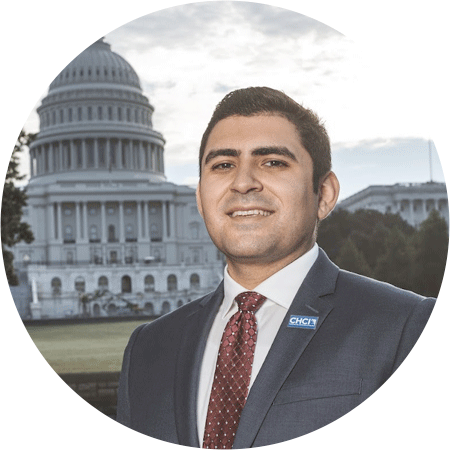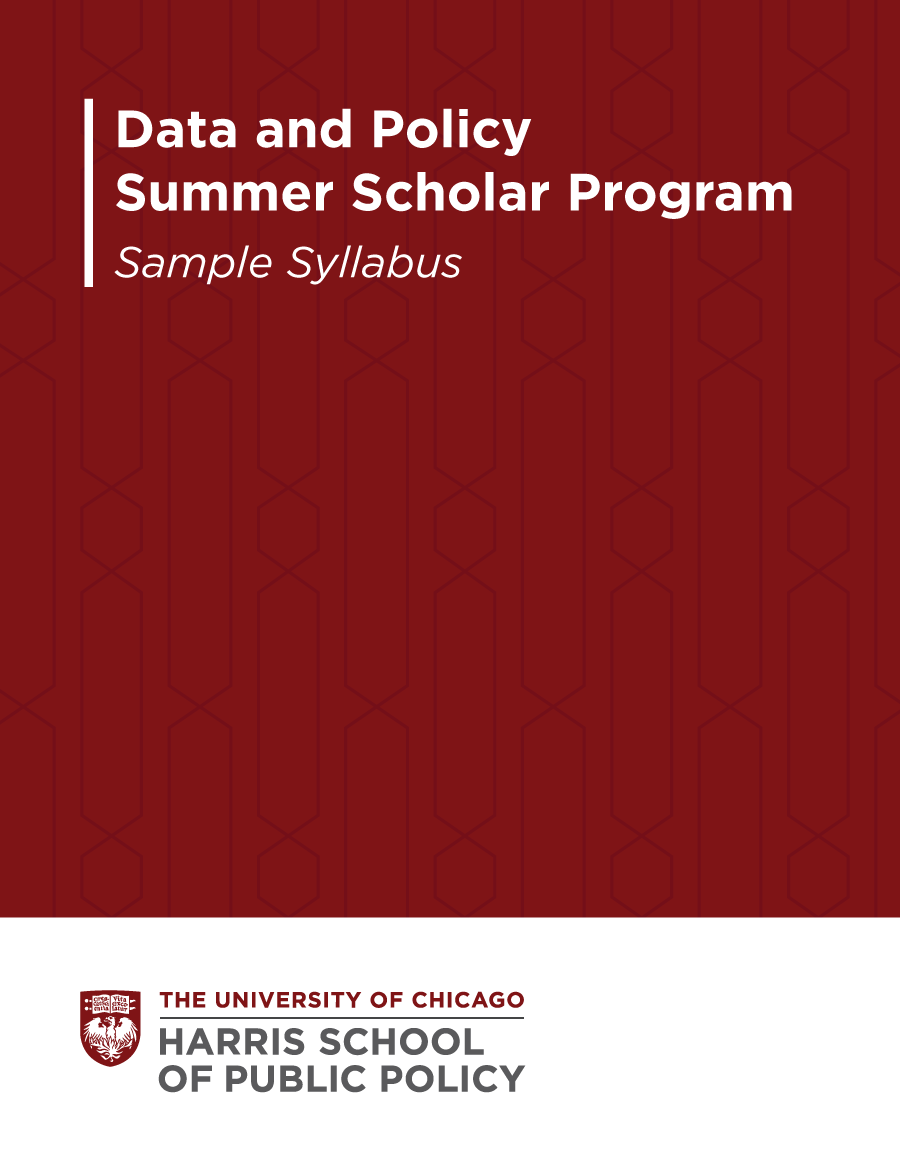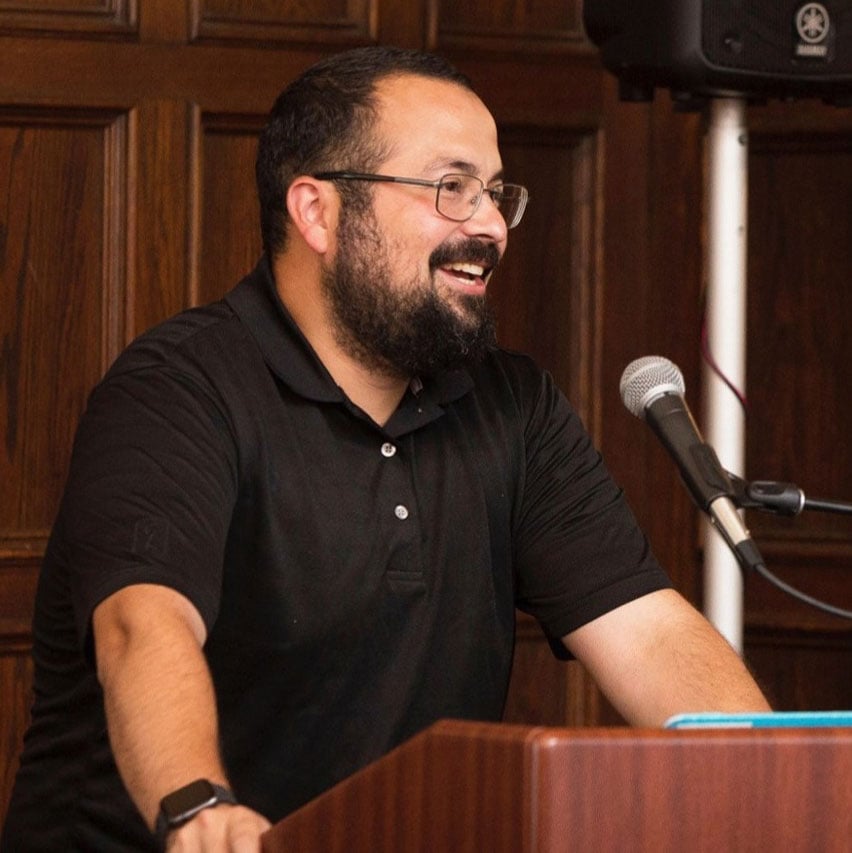Data is everywhere and analytical skills are in high demand by public and private institutions around the world. Over seven weeks, you will gain the skills to retrieve, analyze, and present data through a public policy lens. Learn to use a scientific approach to address today's social issues and create a measurable impact on society.

|
|
Data Analytics, R Programming, Public Policy, Policy Research |
|
|
All levels welcome |
|
|
Seven (7) weeks, 10-15 hours per week |
|
|
July 6 - August 21, 2026 |
|
|
$4,500 with partial scholarship available |
|
|
Virtual Online |

Associate Professor at the Harris School of Public Policy
DPSS equips you with training in data analytics paired with hands-on policy research experience and professional development resources. The program includes three required modules: (1) Data Analytics in Public Policy; (2) Introduction to R Programming; and (3) an immersive Capstone Research Project.
Depending on your primary learning goal, participants can opt for one of the two tracks - the academic track or the professional track. Both tracks provide core foundational courses accompanied by a diverse array of customized resources, ensuring you are ready for your next steps - whether it be getting ready for top-notch graduate programs or preparing for a career pivot.
This course provides an introduction to the statistical foundations, tools, and methods employed by public policy researchers. Explore the fundamental problem of causal inference and learn how to use data, research design, and statistical modeling to navigate around this problem.
This is an introductory course in programming and data analysis for participants with no prior coding experience. It begins with foundational basics and progresses to advanced, practical data analytical and visualization skills in R. By the end of the course, you will be able to use R to retrieve, clean and analyze complicated datasets and produce tables, charts and other data visualization tools to convey your findings.
Read the Blog Post “What can I do with R” by Anna Weiss, DPSS’21, MPP Class of 2024
In the capstone research project, you will collaborate with faculty and a group of peers to tackle a real-world issue with datasets, devising solutions and creating deliverables that can enhance your portfolio online.
Academic track participants will harness the skills of research design, policy analysis, and team collaboration to conduct a research project using open-source or faculty-provided datasets. Participants will individually write a research note, showcasing their academic readiness for graduate programs or research jobs.
Professional track participants will dive into real-world datasets with practical analysis and a focus on data visualization. They will produce a deliverable with data visualization (charts, infographics) to showcase their results.
Read Professor Wright's blog post about the capstone project.
The academic track provides a comprehensive toolkit for participants who are interested in further advancing their academic growth by earning a master or PhD-level degree in the social sciences field. Participants undertaking this track are required to complete advanced statistics and programming learning such as panel data designs, regression discontinuity, instrument variables etc. of the Data Analytics and Programming in R courses, fostering a comprehensive understanding of advanced content. In addition, as part of the Module 3 Capstone Project, participants will individually write a research note that can be used as a writing sample for their graduate degree application. Participants will also join live workshops focusing on understanding the academic world and learn how to conduct public policy research to support their future academic journey.
The professional track prioritizes applied data analytical skills and techniques of data visualization and storytelling, allowing participants to maximize the application of data analysis in real-world professional settings. In this track, participants only need to complete a portion of the assignments of the Data Analytics and Programming in R courses (Module 1 & 2), providing greater flexibility in their time management. Participants will use the Capstone Project as an immersive learning experience to conduct data storytelling and data visualization practice and produce a deliverable. In addition, participants will join live workshops focusing on understanding how data skills can be applied in various types of industry jobs and explore useful resources.
Both learning tracks will have access to:
“The DPSS program was a critical first step. Being out of an academic environment for almost a decade, I wanted to prepare for this rigorous curriculum. While DPSS was challenging, I had an extremely supportive community of classmates, TAs, and professors. DPSS was the tipping point that made Harris my number one choice.”

DPSS’22, MPP'25
"It’s a summer I won’t forget. The quantity and quality of learning kept me engaged, and the other scholars were such a joy to work with. There were people from all walks of life, which was very reflective of the real world. After each session, I felt more and more confident and encouraged to engage with my classmates, faculty, and staff."

DPSS’22
“In the short-term, I wanted to apply the quantitative skills I gained from DPSS to better analyze cyber conflict in the context of the Department of Defense Cyber Strategy of Defending Forward. Long-term, I hoped my exposure to policy practitioners and UChicago faculty would prepare me for graduate study.”

DPSS’21, MPP'24
I decided to apply to the Data and Policy Summer Scholar (DPSS) program to get an idea of what a full MPP degree would entail, and I can’t speak highly enough about the DPSS program. It was very holistic, and as someone who had never coded before, it was a fantastic introduction to data analysis.

DPSS’21, MPP'24
"I decided to apply to the DPSS program because I wanted to gain the quantitative analysis skills necessary to advance my education and transition into public policy. More importantly, I wanted to learn data-driven tools that would help increase my social impact. Today, I'm happy to share that the DPSS program did exactly that and more."

DPSS'21, MPP'24
"DPSS showed me the importance of data and mathematical analysis in developing proper public policy. That accuracy and precision in policy making is exactly what I value and that made me feel more closely connected to the UChicago and the mission of the Harris School of Public Policy."

DPSS'21
| Sun | Mon | Tue | Wed | Thu | Fri | Sat | |
| Weeks 1 - 5 | Break | Optional: Live Office Hours | Break | Optional: Live Office Hours | |||
| Module 1: Data Analytics in Public Policy | Optional: Take Non-Graded Quizzes | Module 1: Data Analytics in Public Policy | |||||
| Module 2: Introduction to Programming in R | Module 2: Introduction to Programming in R | ||||||
| Optional: Community Events | Homework in Progress | Optional: Community Events | Finish Homework | ||||
| Sun | Mon | Tue | Wed | Thu | Fri | Sat | |
| Weeks 6 - 7 | Break | Optional: Live Office Hours | Break | Break | |||
| Module 3: Capstone Research Project | |||||||
| Optional: Community Events | |||||||

DPSS alumni have achieved remarkable success in their pursuit of graduate programs and career development. They continue their academic pursuit in Master's and Ph.D. programs across various fields, including Data Science, Business, Economics, Law, Mathematics, Political Science, Public Policy, and Social Science. Discover how DPSS can empower you on your path to graduate study, including exciting opportunities right here at UChicago, by exploring our blog post, "DPSS Benefits for Graduate School.”
DPSS alumni worldwide
started or completed a graduate program after DPSS
credential alumni enrolled in a graduate program at Harris Public Policy
DPSS alumni have made significant strides in their professional journeys, securing internships, part-time and full-time employment. They've attained diverse positions, including roles as Business Analytics Interns, Data Analyst Assistants, Congressional Interns, Development Coordinators, Financial Analysts, Management Consultants, Software Engineers, and Research Assistants.

Faculty Profile
Austin Wright is an Associate Professor and the Director of Strategic Initiatives at the University of Chicago Harris School of Public Policy. Austin primarily teaches in the Applied Statistics Core, with a focus on using causal inference tools to better understand public policy interventions. He serves as Academic Director for the Data and Policy Summer Scholar (DPSS) program, ensuring the holistic curriculum is designed and taught to meet student needs with the UChicago approach.

Faculty Profile
Sheng-Hao Lo is an Assistant Instructional Professor at the Harris School of Public Policy at the University of Chicago, where he teaches core courses in Statistics, Data Analytics and Microeconomics. He has a broad set of teaching and research interests in applied microeconomics and applied econometrics, with a focus on health policy. He is the Data Analytics Instructor for the Data and Policy Summer Scholar (DPSS) program.
July 6 - August 21, 2026
Participants expect to spend about 10-15 hours per week including watching lecture recordings, working on assignments and projects, joining interactive office hours and community activities.
Asynchronous (pre-recorded) lectures from faculty, optional synchronous teaching sessions with faculty and graduate teaching assistants, and interactive community activities.
These synchronous office hours, conducted in Zoom, are offered approximately 15 hours per week at various times to accommodate our global and working students.
This certification is issued by the Harris School of Public Policy and contains a grade (of points earned) for each academic course. Students will receive an email from our office (harriscredential@uchicago.edu) with the electronic certification within one month after the close of the program.
The program fee is $4,500. We are pleased to offer merit-based partial scholarships to outstanding applicants.
|
Audience |
Fee |
|
General |
$4,500 |
|
Scholarship Range* |
$300 to $1,500 |
|
Organizational Sponsorship for 3+ Applicants |
Contact us at harriscredential@uchicago.edu to discuss group rates |
|
If enrolling in two or more credential programs during the same cycle |
Receive an additional 20% discount on the program fees (after initial discounts and scholarships) |
*Harris Credential Programs is committed to expanding access and reducing barriers to participation. We recognize that cost is an important consideration for many applicants. In the 2025 academic year, 80% of enrolled DPSS participants received scholarships between $300 to $1,500. If you have questions about finances, we encourage you to connect with a member of our admissions team to discuss available options.
Eligible applicants may be considered for the Community Impact Scholarship, which provides $1,500 to DPSS participants. The scholarship application is included in the DPSS application and awards are determined at the time of admission. Please note that recipients of the Community Impact Scholarship will not be considered for additional scholarships. Scholarship awardees are still eligible to receive the multi-enrollment discount benefit.
Once being admitted, participants will secure the seat by submitting a $1,000 USD enrollment deposit, which is non-refundable and applies toward your total program fee. The remaining program fee balance will be paid before the program starts. Detailed payment instructions will be provided to admitted participants via email.
|
|
Application Deadline |
Notification |
Reply Deadline |
|
Early Action |
December 2, 2025 |
Mid-December |
December 30, 2025 |
|
Round 1 |
January 20, 2026 |
Early February |
February 17, 2026 |
|
Round 2 |
March 10, 2026 |
Late March |
April 14, 2026 |
|
Round 3 |
April 21, 2026 |
Mid-May |
May 19, 2026 |
|
Round 4 |
May 19, 2026 |
Late May |
June 2, 2026 |
If the participant decides to cancel their Program enrollment, the participant must submit a request in writing at least 30 days prior to the program start date to harriscredential@uchicago.edu to receive the paid amount less the non-refundable enrollment deposit. Requests received 14 to 30 days before the Program start date are subject to a payment of 50% of the Program fee. Requests received within 14 days of the Program start date are subject to full payment of the Program fee. If the participant is unable to join the Program due to circumstances that the participant has no control or influence over, the refund amount will be considered on an individual case-by-case basis.
Absolutely! DPSS is designed to accommodate individuals from diverse academic and professional backgrounds, including working professionals, recent graduates, and current students. While it may not be without its challenges in terms of time management, it is certainly manageable. You'll benefit from a dedicated support staff, an exceptional teaching team, and the enriching experience of collaborating with a diverse cohort throughout your journey.
DPSS content is rigorous, but we accommodate participants of all backgrounds. There are no prerequisites for this program. If you're new to data analytics, expect to dedicate approximately 12-15 hours per week. For those who have taken some statistics and/or R programming courses, plan for around 8-12 hours per week. If you already possess a working knowledge of statistical concepts and the R programming language, you can typically commit 6-8 hours per week. Our aim is to provide support and guidance to help you succeed, regardless of your prior experience.
We also highly encourage our DPSS participants to take the advantage of the Policy Analytics Credential Program before DPSS starts to ensure you have a solid quantitative foundation and maximize your DPSS experience.
While full funding is not available for the DPSS program, merit-based scholarships are awarded to eligible applicants. Applying early can significantly benefit your chances of receiving financial support.
There is no additional application document required to request being considered for scholarship.
For more financial tips, please read the blog "Financial Planning for Credential Programs".
DPSS provides a comprehensive array of community and co-curricular resources designed to enhance your professional development. Our offerings include weekly virtual events such as the "Policy in Action Speaker Series," "UChicago Community Chats" for networking, "Writing in Policy Workshops," and "Career Exploration Workshops." You can also engage in social activities and consider participating in the optional "Chicago Weekend" on campus. These opportunities are designed to strengthen your professional connections and enrich your DPSS experience. Admitted students will receive additional information about the Chicago Weekend.
The Capstone Research Project is a pivotal aspect of the DPSS program, offering participants the opportunity to engage in hands-on policy research. Under the guidance of DPSS faculty, including Austin Wright, Associate Professor and DPSS Faculty Director, participants collaborate in small groups and access proprietary or open-source data to address pressing policy challenges. Past projects have explored topics such as refugee displacement, the economic impact of mask mandates, and the legacy of the George Floyd protests. The goal of this project is for participants to apply the quantitative analysis and R programming skills they've acquired throughout the program to produce a policy memo. This memo includes a literature review, data analysis, visualization, and a summary of their findings. It's a chance for participants to put their newfound skills into practice and make a tangible impact.
Read Professor Wright's blog post about the capstone research project.
After successfully completing the Capstone Research Project, participants often submit their projects to their current academic institutions or incorporate them into their graduate school applications. Some continue to build on their specific projects, while others apply the acquired research skills to areas they are most passionate about. These research skills are highly transferable and can be applied to various other projects and career pursuits. Many DPSS alumni have found that the Capstone project has strengthened their graduate school applications and opened up opportunities for internships and career advancement in their respective fields.